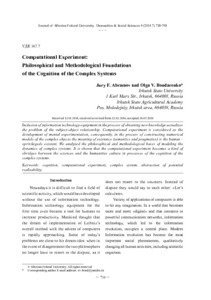Computational Experiment: Philosophical and Methodological Foundations of the Cognition of the Complex Systems
Скачать файл:
URI (для ссылок/цитирований):
https://elib.sfu-kras.ru/handle/2311/10331Автор:
Abramov, Jury F.
Bondarenko, Olga V.
Абрамов, Ю.Ф.
Бондаренко, О.В.
Дата:
2014-04Аннотация:
Inclusion of information technology equipment in the process of obtaining new knowledge actualizes
the problem of the subject-object relationship. Computational experiment is considered as the
development of mental experimentation, consequently, in the process of constructing numerical
models of the complex objects the meaning of existence (semantics and pragmatics) is the human –
«privileged» existent. We analyzed the philosophical and methodological bases of modeling the
dynamics of complex systems. It is shown that the computational experiment becomes a kind of
«bridge» between the sciences and the humanities culture in processes of the cognition of the
complex systems Включение информационной техники в процессы получения нового знания актуализирует
проблему субъект-объектных отношений. Вычислительный эксперимент рассматривается
как развитие мысленного экспериментирования, следовательно, в процессе построения
численных моделей сложных объектов смысл сущего (семантика и прагматика) остается за
человеком – «привилегированным» сущим. Проанализированы философско-методологические
основания моделирования динамики сложных систем. Показано, что вычислительный
эксперимент становится своеобразным «мостиком» между естественно-научной и
гуманитарной культурой в процессах познания сложного

